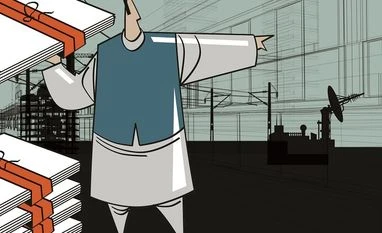There are at least two far-sighted but painful economic measures that the Union government decided to execute since it came to power in 2014. The first one is an aggressive push for digital transactions followed by demonetisation, without which no benefit can accrue to the government in terms of increased taxes in the years ahead. Hence, we consider the push for digital transactions as the first critical economic measure. The second one is goods and services tax (GST). Both of these are essentially aimed at bringing the major portion of the parallel or hidden economy into the mainstream economy and thereby getting accounted into gross domestic product, and in turn, broadening the tax base. The motive behind these two measures is to bring those who have been evading taxes, both direct and indirect, to account and thereby increase revenue for the government and hence higher spending on public utilities.
On the flip side, these two economic measures are disruptive and shake the status quo, which is painful. Other welfare and developmental measures such as Jan-Dhan Yojana, Ujjwala Yojana, Atal Pension Yojana, Awas Yojana, Jeevan Jyoti Bima Yojana, Suraksha Bima Yojana, Swachh Bharat Abhiyan, Krishi Sinchai Yojana, Nai Manzil Yojana, Make in India, Kaushal Vikas Yojana (Skill India), Smart City, Start-up (Stand-up) India are not considered here as they don’t come under the category of painful economic measures.
For good economic measures to yield good political results, the economic measures would have to pass the litmus test on these three riders. The first rider is the timing of the digital transaction push and GST. The government managed to push demonetisation and digital transactions with two and half years left in its tenure. For GST, the government has less than two years. These two measures certainly did not come too early; at the same time they are not too late either. Prime Minister Narendra Modi has about two years to pass on the benefits to the electorate that accrue from his two major economic measures. Thus, the first rider on timing of economic decisions has reasonably passed the litmus test.
The third is the perception and actualisation of overall benefits of economic measures in the minds of voters. This rider is crucial since, in democratic polity, the government has to seek the mandate of the people every five years and the people should have sensed the vestige of some palpable benefits before the tenure of the government. With the resounding success in the UP 2017 Assembly elections, people are confident during the middle of the government’s tenure that these economic measures would fructify in future. However, two more years is a pretty long time for people to remain patient, especially if the traces of benefits are not actualising, let alone actual benefits. The challenge for the government may lie in the third rider.
Only if the government aggressively carries out the implementation of these two economic measures with maximum efficacy will the benefits accrue to the government in the form of higher tax revenues. Thereby, the government will be able to spend the same on improving public utilities and meaningful welfare schemes, at least in the last year of its tenure. GST is expected to be implemented from July 1, 2017. One can expect GST to run into rough weather in FY 2017-18 but it may start giving partial benefits to the government and the country in FY 2018-19, the last financial year of this government’s tenure. The push for digital transactions should be on a war footing by introducing incentives to go digital in a more tactful way, without causing panic among bank users such as charges for cash deposits and withdrawals in banks.
As the push for demonetisation begun at least six months before the implementation of GST, the government should be able to derive maximum benefits in terms of tax collections in FY 2018-19. Modi proved that good economics may not be poor politics when he took severe action against farmers before the 2007 Gujarat Assembly elections, after the then Gujarat government came to know that some farmers stealthily sold electricity given on subsidised rates for non-farming purposes. If the Union government could successfully push digital transactions and GST in the next two years and show some increased spending on public utilities and thereby get a resounding victory in the 2019 general elections, Modi would once again prove that good economics may not be poor politics.
To read the full story, Subscribe Now at just Rs 249 a month
Already a subscriber? Log in
Subscribe To BS Premium
₹249
Renews automatically
₹1699₹1999
Opt for auto renewal and save Rs. 300 Renews automatically
₹1999
What you get on BS Premium?
-
Unlock 30+ premium stories daily hand-picked by our editors, across devices on browser and app.
-
Pick your 5 favourite companies, get a daily email with all news updates on them.
Full access to our intuitive epaper - clip, save, share articles from any device; newspaper archives from 2006.
Preferential invites to Business Standard events.
Curated newsletters on markets, personal finance, policy & politics, start-ups, technology, and more.
Need More Information - write to us at assist@bsmail.in
)